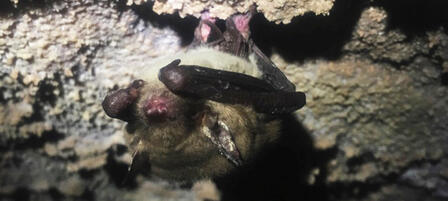First Cave Myotis Bat With White-nose Syndrome Found In Kansas

PRATT – White-nose syndrome (WNS), a fungal disease that affects hibernating bats, has been confirmed for the first time on a cave myotis bat (Myotis velifer), which was collected in Kansas. This brings the total number of bat species confirmed with the deadly fungal disease in North America to 10. Kansas Department of Wildlife, Parks and Tourism (KDWPT) biologists collected sick and dead cave myotis, a bat species common in Kansas, in Barber, Comanche, and Kiowa counties. Samples were sent to the U.S. Geological Survey National Wildlife Health Center in Madison, Wis. for testing, and bats from all three counties were confirmed positive for WNS.
WNS was also confirmed in a unidentified dead bat found in Pratt County, bringing the number of counties in Kansas with WNS to five. Earlier this year, WNS was confirmed in Cherokee and Barber counties.
"Confirming another species with white-nose syndrome is concerning, but something we’ve been preparing for,” said Jeremy Coleman, national white-nose syndrome coordinator for the U.S. Fish and Wildlife Service (USFWS). “As the disease spreads across North America, we’ve looked ahead to fund research that will help us better understand the effects of white-nose syndrome on species previously unexposed to it.”
WNS has been confirmed in 32 states and seven Canadian provinces. It is not known to pose a threat to humans, pets, livestock, or other wildlife and fish. The fungus that causes WNS is spread through bat-to-bat contact, but not all bat species are affected equally.
For more information about WNS in Kansas, e-mail KDWPT wildlife biologist Samantha Pounds at samantha.pounds@ks.gov or Catherine Hibbard, USFWS national WNS communcations coordinator, at catherine.hibbard@fws.gov. To learn more about WNS in North America visit www.whitenosesyndrome.org.
For media requests, contact the KDWPT Ecological Services section at (620) 672-5911.
(Grant provided funding – Endangered Species Recovery Implementation Funds, CFDA Program #15.657.)
-30-









